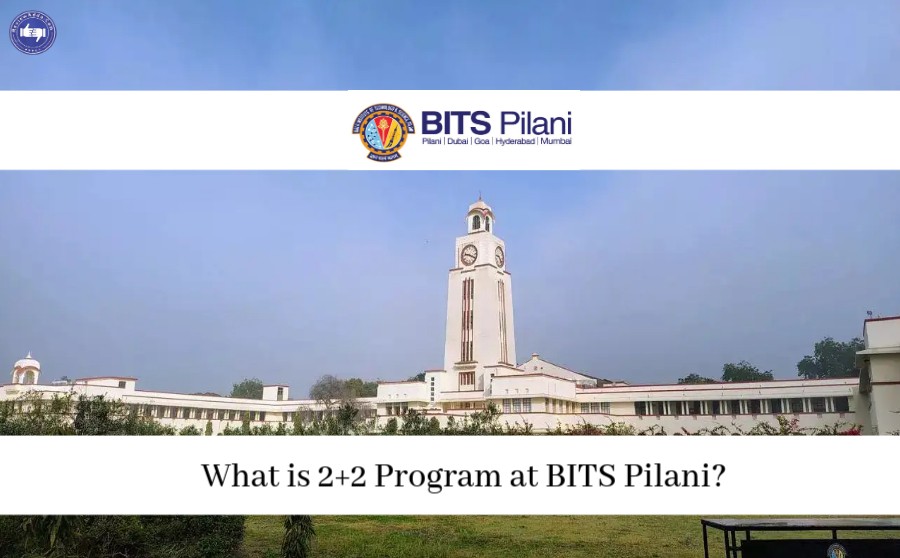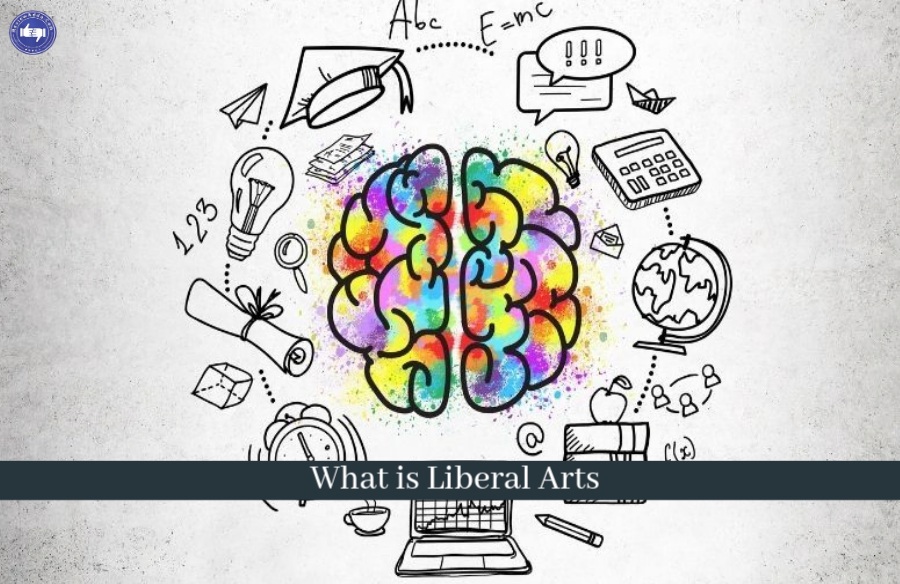Topic We Cover: Mechanical vs Civil
1. The IT slowdown
2. Mechanical and Civil Engineering: Old is gold?
3. Mechanical Engineering and Civil Engineering
4. Mechanical and Civil Engineering: The way forward
5. Mechanical vs Civil: The factors for determination
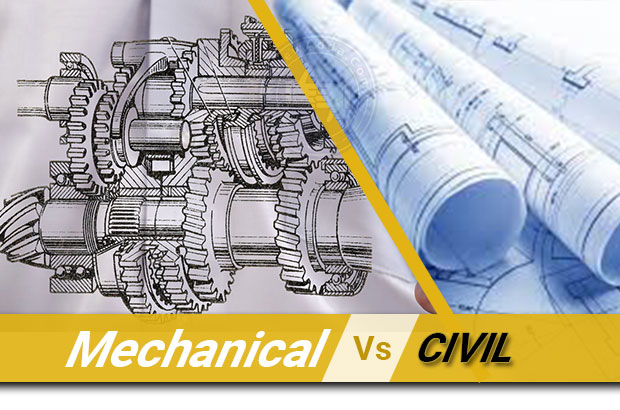
The old guard, Mechanical and civil engineering represent two branches of engineering facing a sharp decline
Akhil, an engineering aspirant in Class 12 dreams of being an engineer for a F1 team. When asked if why he doesn't want to drive the car instead, Akhil fashions a sharp grin. I'm a curious science student, not an adrenaline junkie'
One can't help but admire raw ambition mixed seamlessly with a modicum of pragmatism. Akhil is dreaming, but not with his eyes closed.
How do you think you'll get there?
Akhil's reply was prompt. I'll have to do mechanical engineering. Hopefully I can get a good college next year. From then on, the sky is the limit'
The advent of CS and IT has left mechanical and civil in the dust. High packages at global conglomerates have enticed many students into the fold of Software Engineering. When Akhil was asked why he wasn't choosing CS and IT instead, his answer was as straightforward as it was polarizing.
Have you ever heard of a mechanical bubble?' asked Akhil rhetorically. No. You haven't. However, you must have surely heard of the CS bubble or the IT bubble. Why are CS and IT associated with the term bubble'? That is because they are bubbles. As far as I know, most bubbles burst
Akhil's candor is something Most Mechanical Engineering aspirants and pass-outs feel about other courses. CS and IT may seem attractive options for now, but the demand always returns to normalcy if it skews every now and then.
Rakesh, a civil engineering student feels similarly. Most of my friends are CS and IT students. When I ask them why they choose their respective branches, their answer always comes down to placements. I'm not denying some are genuinely interested, but it's fair to say the latter are a minority
When probed further about this trend, he explained in detail. Consider civil engineering. My batch has only 100 students. None of us took civil because of the salary package. Some choose civil because of a lack of options, but most because of their personal preference and genuine interest. That is why civil engineering is still alive. Students are still passionate about civil. If you take placements away from CS and IT, who will be standing in their corner? From being a field for passionate students, engineering has become the shortest path to the highest package. If money is all you want, become bankers or traders. Leave engineering for us'
The hard feelings mechanical and civil engineering students have for the rise of CS and IT is understandable. At a time when the demand for CS and IT has skyrocketed, the demand for mechanical engineers in manufacturing and civil engineers in construction has seen a sharp decline.
Amongst other Types of engineering EC and EE, often considered the younger sister branches of mechanical and civil, have romped ahead of the latter due to the persistent IT bubble' as well. While the IT sector has hired mechanical and civil engineers too, the salary and role offered is simply not proportionate to where they could be at a core company.
The IT slowdown
Many onlookers of the IT slowdown have termed this downturn as a mere trend. These particular onlookers have unsurprisingly been from the education industry. But why are colleges, especially those from the lower rung, invested so much in the IT industry?
The graphic below represent a lower tier engineering college's placement statistics.
From the graphic above it is abundantly clear that the IT sector is a major recruiter at this particular college. Another important factor to consider is that top IT companies such as Cognizant, Wipro and TCS are amongst these recruiters.
Like this college, many other Lower tier colleges have enjoyed record placements over the past few years. In India where the education industry has come down to a bottomline, placements have become a make-or-break factor for colleges.
While top colleges like the IITs and BITS haven't seen placements skew disproportionately to the IT sector, the same cannot be said for other private colleges. Even VIT and SRM, private colleges of reputable status, have been beneficiaries of the windfall the IT sector brought.
And now it all is coming to an end.
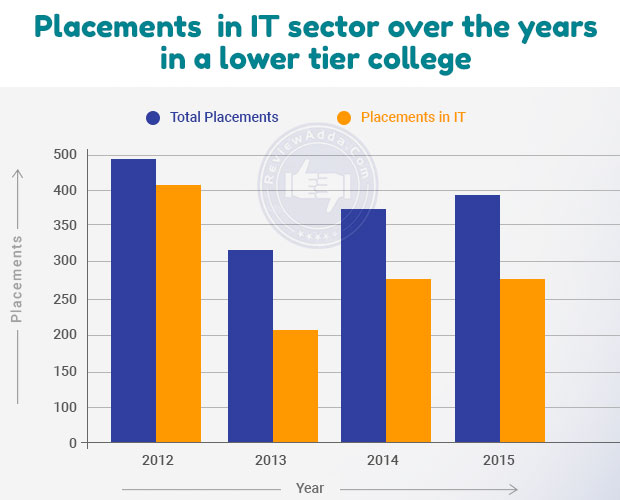
Placements in IT with respect to total placements at a lower tier college
Of the many IT companies in India, only 58% were looking to hire new employees over the April-September period, according to an Outlook survey done by Experis IT Employment in April. While the actual statistics of what the actual hiring rate aren't available yet, it is fair to say that the mood on the ground isn't all rosy.
Experts have put this downturn down to the global economy slowdown, rise of automation and lack of skilled workers. The lack of skilled workers is surprising, if one considers the craze for CS and IT branches in India. Since most colleges have been dependent on the IT sector for placements, one would assume they would make sure that the students are well trained and ready to be a part of the IT sector at the very least.
Sadly, that hasn't been the case. The void for skilled workers has led to the premature rise of automation in the IT sector. While everyone envisioned the eventual arrival of automation, no one expected it to make an impact so early.
Mechanical and Civil Engineering: Old is gold?
Throughout the period where CS and IT dominated the field of engineering, mechanical and civil lurked in the shadows. Like IT is now being hit with automation, the first victim of this trend was mechanical engineering and manufacturing engineers.
Take India as an example. Between 1960 to the late 1980s, India needed a healthy flow of mechanical engineers to ensure the smooth functioning of practically every industry. Nearly every field of manufacturing needed mechanical engineers at the helm. During this long period of limitless employment opportunities, mechanical engineering earned the tag of being an evergreen' branch.
Similarly, civil engineering saw a golden period during the same period as well. With a growing economy, the demand for housing, offices and public projects was obvious. Civil engineers thrived during these years and were the most well paid engineers during that time.
Fast forward to 2017 and both these industries seem directionless. The case for mechanical is a bit different as the branch is slowly moving towards advanced fields like mechatronics and robotics. This transition will take time as will mechanical engineers to adapt to a new system.
 Get Updated Review ( Voice Based Alumni Feeback)
Get Updated Review ( Voice Based Alumni Feeback)
-
 Check Review (Alumni Feedback) - Lovely Professional University - [LPU] – Click Here
Check Review (Alumni Feedback) - Lovely Professional University - [LPU] – Click Here -
 Check Review (Alumni Feedback) - Amity University – Click Here
Check Review (Alumni Feedback) - Amity University – Click Here -
 Check Review (Alumni Feedback) - Manipal University – Click Here
Check Review (Alumni Feedback) - Manipal University – Click Here -
 Check Review (Alumni Feedback) - SRM University Sonipat – Click Here
Check Review (Alumni Feedback) - SRM University Sonipat – Click Here -
 Check Review (Alumni Feedback) - Ansal University – Click Here
Check Review (Alumni Feedback) - Ansal University – Click Here
On the other hand, the situation for civil engineering seems perplexingly bad. Unlike mechanical which is now being forced to evolve with a changing world, civil engineering is still stuck in its golden period. To understand the problems plaguing these two branches, we shall pit them against each other to find where they are going wrong.
Mechanical Engineering and Civil Engineering
To define mechanical engineering in a few sentences is like describing the Mona Lisa in a few words. To use the most clichéd definition, the study and application of machines in their entirety is mechanical engineering. Every type of a machine comes under the purview of a mechanical engineer. From a mixer grinder in a kitchen to a V8 engine in a Formula 1 car, Mechanical engineers are needed everywhere.
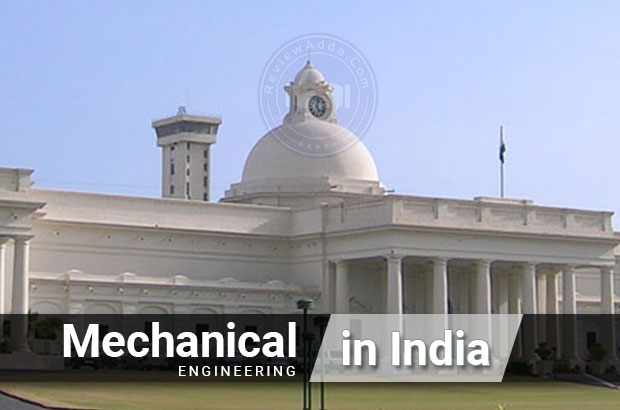
IIT Roorkee is regarded as the best college for mechanical engineering in the country
Civil Engineering is built on a more specific plank. It is a field of engineering focused on the design, construction, and maintenance of physical structures such as dams, bridges, roads, buildings, canals and so on. Like mechanical engineering, civil has also witnesses a downfall in jobs and growth. Much of this has been attributed to a lack of evolution in the department itself. The curriculum in most colleges has not seen drastic reforms in decades. It seems colleges are not interested in improving civil engineering altogether', says Rakesh.
With such wide ranging applications, it is difficult to understand why did jobs in Mechanical and civil engineering dry up? Some of the reasons are given below.
- Approach of colleges
The universal law every being on Earth has to obey is evolution. Unfortunately, our education system failed to grasp the gravity of not obeying this law.
In India, the functioning of higher educational institutions is regulated. This means most colleges have to work within the framework provided by the university they are affiliated to. This framework includes curriculum, number of credits students need to earn and teaching methodology.
The IT boom saw most of these colleges enjoying some of their best years. IT companies hired students left, right and centre irrespective of their branch or college reputation. The advent of fields like Big Data, Analytics and IoT have burst the IT bubble and left these colleges in the lurch.
Without placements, how can these colleges attract more students? Many educational experts feel most colleges are clueless about the future. They understand that placements will go away as IT recedes into the background, but they simply do not have a solution to solve this problem.
The failure of most colleges in India to evolve their branches over the years has led to engineering as a whole reaching an inflection point. Besides mechanical, most of the other branches will feel the brunt of the industry slamming its doors shut.
- The rise of automation
It would be silly to assume automation has been the sole contributor for the downturn in mechanical jobs, but it is fair to say that it has played a huge role in making it happen.
In a free market system, companies will always look to cut costs and increase profit margins. When the option of incorporating automation was made available to companies, they didn't think twice and went for it.
Besides being extremely efficient, automated machines have numerous advantages over regular human workers. The only way mechanical engineers were going to survive automation was by evolving simultaneously into other departments such as automation development, AI research and IoT integration. Their failure to do the same has been the reason behind the fall of manufacturing jobs.
- Archaic mindset
Many mechanical engineering students and teachers are still stuck in the 1990s school of thought. Automobile companies are no longer hiring mechanical engineers in droves as they once did a few decades ago.
Even experienced faculties in mechanical departments are partially guilty of living in the old days. Their refusal to accept changes in the mechanical industry has led to a hiring freeze hitting all manufacturing industries. Besides the top colleges, no company is going out of its way to unearth a mechanical engineering talent at a lower tier college.
Mechanical and Civil Engineering: The way forward
The way forward for mechanical is integration. One thing which has been made abundantly clear is that companies won't move away from automation. To counter this trend, the response has to be on three different levels.
- Restructuring of affiliation policy
Granting top performing institutions full autonomy will give them a free role in dictating their own curriculum and teaching methodology. Anna University in Tamil Nadu dictates even the time table set by an affiliate college. This type of a centralization of power has to end.
- Recalibrating the level of teaching
According to a recent survey, 80% students applying for post-graduate courses do so because they couldn't find a job anywhere else. If colleges continue scraping the bottom of the barrel to find faculties, what hope do colleges really have?
Like any field which loses popularity, teaching has seen a downturn simply because of a lack of incentives. The perks for working for any industry have to be obvious if the industry wishes to thrive. If one considers the Indian education system, the incentives are simply not there.
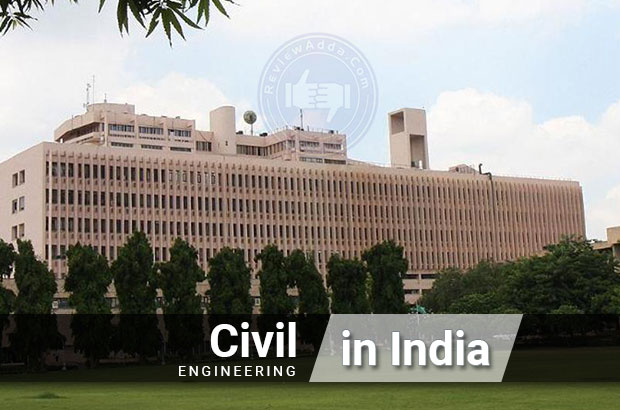
For Civil engineering, IIT Delhi has always been the best college in India
Besides creating strong incentives for professionals to become faculties, there is also a vital need for current faculties to become up-to-date with new technologies. Engineering is a very dynamic field with new methods and techniques being adopted every minute over old and redundant methods. If faculties continue taking the same cavalier attitude towards teaching, fields such as mechanical engineering will be the first to become history.
- Students have to be encouraged to devote more time to studies
The cliché surrounding engineering has slowly become, We'll study one day before the exam
The reason students continuously ignore college studies until the last moment is because they can get away with it. Rakesh, the civil engineering student we talked to earlier explains this phenomenon. Most of what is taught in the class is exactly how it is explained in the standard textbooks. So, if a student keeps his head down one day before the exam and prepares well from a standard textbook, he will pass easily. And that is exactly what the college and parents want. My father doesn't care if I understand civil engineering. All he asks of me is to do well when the exams come. If a student passes after studying just one day in a semester, he stands vindicated of all the criticism he may have received from faculties during the semester. If faculties only want to stick to standard books, the question shouldn't be why are students not studying during the entire semester, it should rather be why should they?'
He continued further. If I can study one day and pass an exam, why should I study the whole semester? I can enjoy myself and have a good time with friends. If faculties really want us to study, they will have to broaden the narrative during classes'
It is hard to question Rakesh as this is exactly what faculties and parents want from students. Pass the exam.
The propagation of this phenomenon will be the final nail in the coffin of engineering colleges. If the students and faculties choose to ignore the demands of the industry and become mutual beneficiaries in a rotten system, the industry will ignore them as well.
Mechanical vs Civil: The factors for determination
Mechanical and civil are two branches with different foundation, but similar predicaments as of now. Students not interested to be swamped into the IT sector are turning to these two branches. But which one holds better prospects? We use five factors to decide.
- Scope
To choose a branch without knowing its scope is like walking to the North Pole using a magnetic compass. It will surely show you true north but it won't tell you the problems you'll face on the road.
The things to consider while choosing a branch are industry supply and demand, risks and opportunities if automation comes into the picture and growth of the industry.
- Placements
While many condemn mechanical and civil students as non-job-seekers going by placement trends, there are opportunities, even a few, for mechanical and civil engineers. The key lies in developing useful skills which employers tend to look for during campus placements. Instead of following college doctrine, mechanical and civil students should consider other sources to hone their skill set for placements.
- Rate of evolution of the stream
As mentioned before, any branch of engineering which refuses to evolve with time will perish. Mechanical engineering and civil engineering face the same battle. With the IT sector slowly receding, whichever of these two branches can sort its act together will become the leader of engineering in the country.
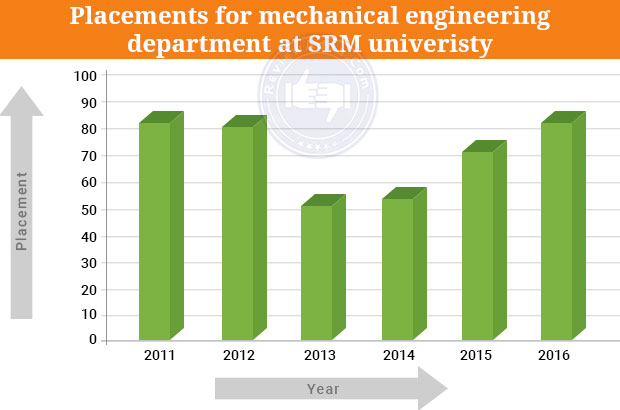
Placements in mechanical engineering at SRM University over the years
- Availability of quality colleges besides IITs
Civil and mechanical are two courses which require imparting of top quality teaching otherwise it is useless to pursue them. While the IITs only account for a fraction of mechanical and civil engineers produced in the country, one has to look at other colleges and the quality of their teaching if these two branches are to be considered seriously.
- Integration with other branches
The future of practically every branch in the future lies in integration. The days where each branch operated independently without having any working knowledge of another field are now officially over. While some integrated branches like Biotech and Bioinformatics haven't delivered the best results until now, it is imperative to remain patient with these types of streams.
For mechanical and civil, the future doesn't lie in working in isolation but combing resources with other branches to develop new types of solutions for modern day applications.
- Job Growth
There is a reason why most science students in schools prefer engineering over pure sciences. The rate of growth in any given Engineering job is much more compared to other walks of life. An engineer at his/her best is expected to be a technically adept top-draw professional. Engineers are also expected to be updated about technological inventions which can be incorporated and innovate themselves while looking for solutions.
With such a demanding job profile, it is clearly understandable to envision high growth rate for engineers. Amongst mechanical and civil engineering, the candidates have to choose which field can offer a better job growth considering the estate of the industry and the economy.
|
Factor |
Mechanical |
Civil |
|
Scope |
The scope of mechanical on its own is limited considering nearly all of its industries are moving towards automation. However, when combined with fields like electronics and robotics, the applications for mechanical engineering seem endless |
The scope of civil is still huge in India. There are many projects available at all times, be it the government or the private sector. The problem is the flow of quality civil engineers |
|
Placements |
Placements across top government colleges have been remarkable as always. Private colleges such as SRM have also maintained a decent track record coming to placements. |
Placements for civil engineers have been a massive problem. While mechanical is a bit more diverse, civil is a highly specific course. Only a few top students are placed from mid-tier colleges who fit the exact profile a company is looking for. |
|
Rate of evolution of stream |
Mechanical departments are slowly understanding the importance of automation and robotics. Subjects such as mechatronics and instrumentation are being introduced to mechanical students. |
Civil is not evolving at the pace many industry experts would prefer otherwise. Despite many construction companies having a shortage for civil engineers, the quality of students in mid and lower tier colleges simply isn't good enough |
|
Quality of teaching besides IITs and other top colleges (out of 5) |
2.1 |
2.0 |
|
Integration with other branches |
Mechatronics, robotics, AI development and machine learning are being introduced as minor courses for mechanical engineers across many colleges in India |
Civil, because of being too specific, does not come up when integration is discussed |
|
Job Growth (out of 5) |
3.7 |
4.1 |




